I spend nine days in Kolkata. I volunteer at Prem Dan every morning except Thursday, our day off, and I go to Shishu Bhavan, a motherhouse for children with disabilities, a couple of afternoons.
(Warning that I am about to describe some of the injuries and illnesses I’ve seen at the motherhouses.)
Things do not get easier after day one. In fact, they get much harder. The first day is much less of a shock than I was expecting—I was ready for the rail-thin, hunchbacked bodies of women who have been bedridden for months. As the days go on, there are more and more moments that puncture my protective mental bubble. One woman who sits rocking in her chair every day has no eyes and is missing part of her nose. My guess was that she’s been a victim of an acid burning—sometimes women in India are splashed with acid by family members for failing to produce a son or otherwise failing to live up to their expected duties as wives. I later learn from a longtime volunteer that this is indeed the case—the woman was burned by her husband after she learned he was having an affair.
Several days I have to help people in the bathroom. There are two bathrooms: one that is fairly clean with standard Indian squat toilets and a sink with soap. The other, the one where people go if they need help, has several commodes that open directly onto the concrete floor. So the entire room is a giant toilet—one you flush by splashing a bucket of water over the floor towards the drain in the corner.
Some days have bright moments. On my third day I feel a surge of warmth when a woman I’ve massaged a couple of times greets me at the door with a hug.
I befriend Justine, a sassy Indian staff member who scolds me in English—“Oh my God. Quickly, quickly with dishes washing!” as I toss metal plates too slowly into the rinsing water—before giving me a cheeky grin to let me know she’s joking around.
On my fourth day, I toss out a few Bollywood dance steps in time with the music playing behind me to entertain a few of the women. They grin and point at me. I twirl around and realize most of the Indian staff are also watching. They are laughing and clapping. “Dance, yes!” they encourage me. I grab Justine’s hand and try to get her to join me. “Challo!” I say (“Let’s go!”).
Other days are harder. Every day there are a few new volunteers who must learn the routine. Not all of the newbies speak English, and most of the Indian staff don’t. So communication is reduced to a few shouted words, pointing, grabbing volunteers by the hand and dragging them to where they’re needed. I am reminded of the scene in Kill Bill where Pi Mai tells Beatrix that if she can’t understand him, then he will “point, hit you, train you like a dog.”
Some days I see the staff treating the patients roughly. At Shishu Bhavan, more than once I see a staff member pick up a child by her arm. At Prem Dan, I see staff hit patients and shout at them. Sometimes I see moments of kindness and tenderness, like when a staff member plays with a child and tickles his cheeks. But most of those tender moments come from volunteers.
One day a few volunteers get scolded for talking too much.
One day Justine tells me she thinks I am doing a good thing.
One day two American girls make most of the beds wrong and we have to go around fixing all the sheets so they’re tucked in perfectly.
The patients never wash their hands after using the toilet.
A woman points to an open sore on her foot and when I tell a staff member, she shrugs and says, “Sister.” Get a sister, a nun. And walks away.
I try to give water to a bed-bound patient I’ve been feeding. She’s lying down. I can’t pour it into her mouth, and when I try to prop her up, she shrieks with displeasure. I mix a little water into her food. It’s 95 degrees outside and there is no AC in the room. She needs the water, but I can’t give her the water.
One day an Australian girl, who’s only been volunteering for two days, has to assist as the sisters wash down a new patient who was found on the street. I see the Australian girl crying. Later she describes in detail the wound that was in the woman’s foot. I won’t repeat it.
On my last day, a group of us eat at the Spanish Cafe on Sudder Street. An American and his Dutch girlfriend are sitting next to us, and he strikes up a conversation about motherhouse. He says that there are a lot of criticisms of the motherhouses, some because the procedures there are inefficient (true) and some because the work conditions aren’t as hygienic as they should be (also true, though some experienced volunteers said they were much, much better than at most Indian hospitals). He also says that as a volunteer, he usually felt superfluous and like he wasn’t doing much to help. “There are human connections you can make, like with small things you do like paint the ladies’ nails. But the staff would still get the work done without the volunteers.”
I think about how slowly the laundry goes without us there to help. I think about how many people we needed to feed by hand. But I find myself wondering if he’s right, in a way, and spend a while thinking about what, if any, “difference” I’ve made this week, or that anyone makes in any week.
Later, the American, who is planning his next year of travel with the girlfriend (he tells me he’s been “traveling for 4 years”), looks up from a list of teaching and volunteering options across several continents and jokingly asks, “What should we do with our lives, Chelsea?”
I smile. “Well,” I say. I am thinking about the little girl with cerebral palsy who I held in my lap and sang to for an hour and a half to help her calm down. “This is what I think.” I am thinking about the little blind boy who squealed with pleasure as my friend Fatima tickled his stomach and danced him around the room singing him songs in Spanish. I am thinking about a Malaysian girl, Jasmine, giving women at Prem Dam long, deep massages and the smiles of pleasure she elicited. “I worked on the Obama campaign in 2008. When I registered people to vote, some said, ‘Bah, I don’t vote, because it doesn’t matter.’ So, statistically, maybe, yeah, it’s a pretty small percentage, one vote. But I always told those people (credit to my father for this next line), ‘If everyone felt that way, then no one would vote. So it DOES matter.’ I’ve been thinking about what you just said, about volunteering at motherhouse. It’s a small difference, maybe. But I think it does matter. So I guess whatever you do, believe that, I think. You know?”
The American smiles slightly. I don’t know if he does know, but he nods a bit. “Fair enough,” he says. “Fair enough.”
Me and one of the patients (who was always bossing me around, in a good way)
Desiree, one of the Australians, giving a hand massage
An American volunteer with a patient
Another one of our lovely ladies…
…and another…
…and another!
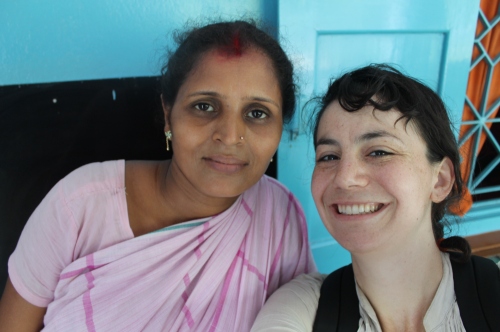 Me and the ever-sassy Justine. I owe you one for showing me the ropes, buddy.
Me and the ever-sassy Justine. I owe you one for showing me the ropes, buddy.
Prem Dan
The Prem Dan volunteers!



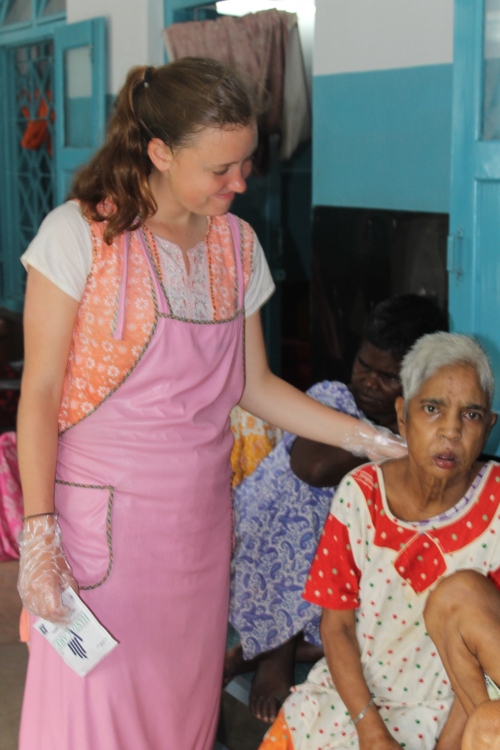
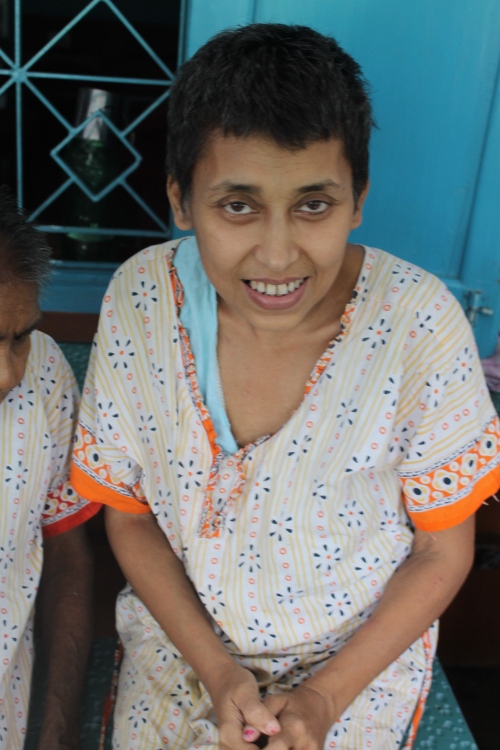
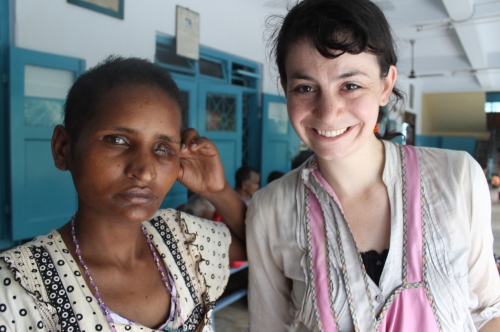
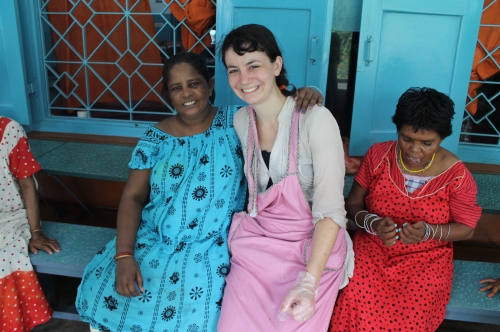
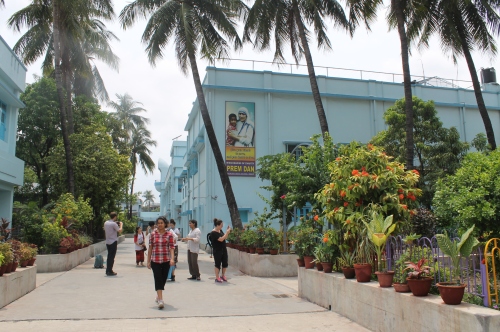
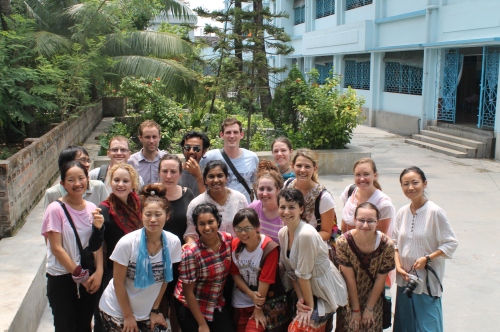
It is amazing that you can do these things. You should be very proud of yourself.
Second Dad. And you are right: will you fix the world by volunteering (rather heroically, selflessly and impressively)? No. But will you make a difference–the difference one person can make? Absolutely! xxx
PS–I just love these photos.
do you have address of Chennai’s nun house ?